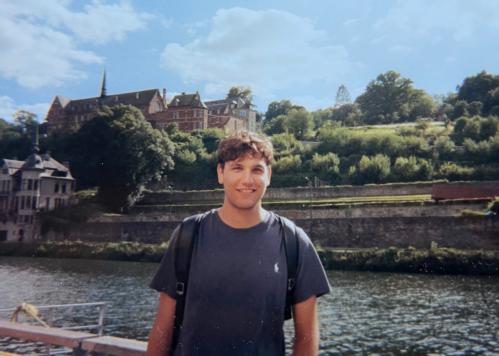Gennaro Ambrosino
 PhD Italian Studies
PhD Italian Studies
Email: gennaro.ambrosino@warwick.ac.uk
About
I am a current Mphil/PhD student in Italian Studies at the University of Warwick, funded by Chancellor’s International Scholarship, under the supervision of Prof. Fabio CamillettiLink opens in a new window.
Research
My research project examines the intersections between archaeology and the ‘unconscious’ in Italian culture from the late 18C through the mid-19C. In particular, it postulates the existence of a common ground between the rise of Etruscan studies and the transnational dissemination of scientific and pseudo-scientific imaginary in printed culture (influenced e.g. by Mesmerism), and particularly in the periodical press. The inter-relation between the historical-archaeological reflection on semi-forgotten, pre-Roman cultures on the one hand, and the psychological-medical discourse on the other, concretizes itself in the shared metaphor of the ‘buried past’, heralding the conceptualization of unconscious memory across the long 19C. Therefore, the project possesses an interdisciplinary outlook, intercepting for the first time rising trends in different fields such as the cultural history of Archaeology, the study of ‘Occulture’ (Partridge 2004) in Enlightenment and post-Enlightenment imaginary, the increasing reappreciation of periodical press as a vehicle for transnational exchanges, and the individuation of post-Revolutionary culture as the intellectual prehistory of psychoanalysis.
From 1779 on, Occultural discourses were often intersected with that of Mesmerism (or Animal Magnetism), i.e. a pseudo-scientific therapeutic practice based on magnetism. It is now established that mesmerism and the medical use of hypnotism had a strong impact on the later birth of psychotherapy as a discipline (Ellenberger, 1970; Crabtree, 1993), but its relevance in Italian context is still under-researched despite the relevance it had in the construction of the Italian nation (Gallini, 1983). Recent scholarship has stressed the role of Mesmerism in eroding Western paradigms of rationalism (Smith 2019) and showed how it contributed to the emergence of the unconscious as a construct, voicing subjects that were traditionally excluded from dominant discourses, such as women, illiterate people, and the mentally insane (Goldstein 2005; Arnaud 2014). Etruscan studies had a pseudo-scientific status for decades before they were codified as a distinct branch of Archaeology (Pallottino 1984; De Francesco 2013). This exclusion from official science favoured the reciprocal contamination between the discourses of early Etruscology and 19C ‘Occulture’ (Piperno 2020). In the development of the project, a crucial role will be played by the study of the periodical press as a vehicle for the transnational circulation of ideas.
Research Interests
- Nineteenth-century Italian literary culture
- Literature and science
- The irrational and the Unconscious before Freud
- Italian travel literature
- History of Science and Medicine
Publications
-
Gennaro Ambrosino, “Etruscan studies and the Infernal Landscape in Vincenzo Cardarelli’s prose d’arte”, in Zampieri C., Piperno M. and Van den Bossche B. (eds.), Modern Etruscans: Close Encounters with a Distant Past (Leuven: KU Leuven University Press, 2023), pp. 127-145. https://library.oapen.org/handle/20.500.12657/76515
- Gennaro Ambrosino, "La diffusione del mesmerismo nell’ambiente culturale napoletano: i Racconti inverisimili (1886) di Federigo Verdinois”, Incontri. Rivista europea di studi italiani, 37 (2022), pp. 1-14. https://doi.org/10.18352/inc12866
- Gennaro Ambrosino, “Leopardi e il mesmerismo: una lettura in chiave magnetica del Tasso”, ENTHYMEMA, 27 (2021), pp. 31–43. https://doi.org/10.13130/2037-2426/14470
Conference Papers
- “Tra religione e scienza: le origini e la diffusione del mesmerismo nella cultura italiana (1779-1853)”, at the international conference (KU Leuven-University of Warwick), Spiritismo e letteratura italiana tra il Settecento e il Duemila, Leuven, 29-30 settembre 2023.
- “Tra dimensione spaziale e temporale: il paesaggio nelle prose di viaggio di Vincenzo Cardarelli”, at the annual conference of Associazione degli Italianisti, Contemplare/abitare: la natura nella letteratura italiana, Napoli, 14-16 settembre 2023.
- “Mesmeric Imagery in Leopardi’s Works: a ‘Magnetic’ Reading of Dialogo di Torquato e del suo Genio familiare”, at the one-day Symposium Leopardi in the UK, Christ Church, University of Oxford, 26 May 2023.
- “Gli etruschi nel Risorgimento: la rappresentazione di Viterbo nelle memorie archeologiche di Francesco Orioli (1783-1856)”, at the International Symposium All’Etrusca. La scoperta della cultura materiale e visiva etrusca nell’Europa premoderna e moderna, École française de Rome, 23-25 February 2023.
- “Archaeology and the Unconscious. Tackling the Mystery from an Interdisciplinary Approach (1745-1845)”, at the Annual Conferences of Canadian Association for Italian Studies, online, 12 June 2021.
- “Da Muratori ad Orioli: le origini del mesmerismo italiano”, at the Conference Il mesmerismo nell’Otto-Novecento, Laboratorio Leopardi Sapienza, University of Rome “La Sapienza”, 24-26 May 2021.
Organized Events and Workshops
Co-Organiser: International Conference, University of Warwick – KU Leuven, Spiritismo e letteratura italiana tr ail Settecento e il Duemila, 29-30 September 2023 [funded by HRC “Funding Conference” scheme and MDRN KU Leuven]
Co-Organiser: SMLC PGR Symposium, University of Warwick, Rethinking the Crisis Across Languages and Cultures, 12 May 2023.
Scholarships and Awards
HRC Doctoral Fellowship Competition 2023 for organising one-day conference in Spring 2024
Chancellor’s International Scholarship, University of Warwick, 2022.
Erasmus+ Scholarship, Katholieke Universiteit Leuven, 2020.
Qualifications
MA in Western Literature, Katholieke Universiteit Leuven.
MA in Modern Philology, Università degli studi di Roma “La Sapienza”.
BA in Modern Languages and Cultures, Università degli studi di Napoli “Federico II”.
